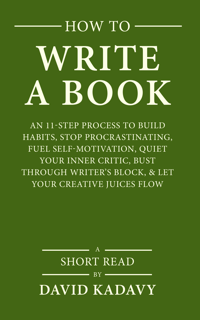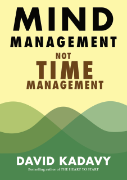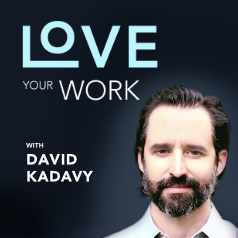Subscribe to blog updates via email »
How To Be Somebody – Love Your Work, Episode 271
 There’s something I want to talk about, but frankly, I’m a little embarrassed to do so. However, I write with my former self in mind, and my former self would want to know about this. So here I go.
There’s something I want to talk about, but frankly, I’m a little embarrassed to do so. However, I write with my former self in mind, and my former self would want to know about this. So here I go.
I want to talk about how to be somebody.

WANT TO WRITE A BOOK?
Download your FREE copy of How to Write a Book »
(for a limited time)
Listen to the Podcast
- Listen in iTunes >>
- Download as an MP3 by right-clicking here and choosing “save as.”
- RSS feed for Love Your Work
What do I mean by “somebody?” To be somebody is to be known for your work. To have your name synonymous – or even better, eponymous – with your accomplishments.
I used to be “nobody.” Now I am “somebody.” I am known in some circles for my work. My work has led to accomplishments I’m proud of. My work and I are one.
There have been many steps on my journey to becoming somebody, but if I had to pick one day, it was September 14th, 2011. That was the day my first book debuted in the top 20 on Amazon. It’s hard to overstate what a massive change it was, in every aspect of my life, to overnight go from an unknown tinkerer to a “best-selling author.” The day I became somebody, my life changed.
The benefits of being somebody
Being somebody comes with some benefits. Here they are:
- Career success: This the best reason to become somebody. Name recognition helps you make money for the work you do. The money for the work you do helps you do more of that work. But career success can come in other forms. Being somebody has meant that I’ve gotten speaking invitations all over the world. Thanks to the ones I’ve been able to accept, I’ve spoken all over the U.S., and in eight countries.
- Respect: When I became somebody, everyone started to show me more respect. Introductions went from, “This is David, he is weird and I’m not sure what he does” to “This is David, he’s a famous author.” (Prior to becoming somebody, I was introduced by a well-known Chicago entrepreneur – right in front of my face – as a “malingerer.”) When I became somebody, my idiosyncrasies and lifestyle choices suddenly weren’t viewed as odd. Instead, they were seen as something you would expect from a creative person who is somebody.
- Connections: Because I am somebody, I can make connections with other somebodies. If I’m interested in the work of another somebody, I can reach out to that person, and they will generally respond. Or, I can ask for an introduction from another somebody. I’m rarely more than a degree or two away from the somebody I want to meet. This is how I managed to interview many somebodies I admire for my podcast, such as Adam Conover, Elise Baurer, David Allen, James Altucher, Seth Godin, and many more.
- Dating prospects: When I became somebody, my dating prospects improved immediately. This admittedly has downsides, because you don’t want to be with anyone who wants to be with you because you’re somebody. And if you think being somebody entitles you to love you’ll become a horrible person. But being somebody serves as a signal that you’re trustworthy. Even though, in recent years, many much-bigger somebodies have turned out to not be trustworthy, the social proof that your accomplishments have gained you name recognition counts for a lot in at least getting someone to acknowledge you as a potential mate.
- Random perks: I’m only known for my work in small circles, but that doesn’t prevent me from being “somebody” outside those circles. I don’t flaunt my somebody-ness, but people Google. Oh, do they Google. There have been many situations where someone has discovered I was somebody, because they Googled me, and then they commented on it. Which means there have been many other situations where they didn’t admit to it. This improves your prospects in a variety of situations. Sometimes that’s intangible, but I know it once at least helped me rent an apartment for a couple months during a mini life.
Being somebody isn’t all upsides. I’ll get to more of the downsides later. But if you want to become somebody, how do you do that?
Why do you want to become somebody?
Before you try to become somebody, ask yourself why you want to become somebody. This can be a hard question to ask and it gets to the heart of why I’m a little embarrassed to even be talking about this. American culture is driven by people desperate to become somebody, but it’s unfashionable to openly admit it’s something you want.
What do you want out of being somebody?
If you want to become somebody, ask yourself what you expect to get out of it. It might not even be necessary to become somebody to get those things.
The best reason to become somebody is to get paid to do what you love, so you can do it more. Being somebody is a job requirement behind many creative professions, such as an author, musician, or entertainer. It’s hard to substitute the benefits of being somebody in these cases.
But if you want respect, or for various parts of life to become easier, there are other ways to get those things. For example, you can make connections with somebodies simply by being more outgoing and intentional.
A dirty little secret about the benefits I mentioned earlier is that much of the value of becoming somebody doesn’t come from being somebody in the eyes of other people. Much of it comes from being somebody in the eyes of yourself. If you want to be somebody, and you feel you are not, you will have little confidence. If you don’t want to be somebody in the first place, nothing stands in the way of your confidence. And confidence is a big part of success.
What are the downsides of becoming somebody?
Being somebody comes with downsides and risks, and you should have these in mind if you’re going to try to become somebody.
I think I have about the right amount of somebody-ness. The vast majority of people have no idea who I am. A small circle of people respects what I do, and when I meet them, they are always interesting and nice people. As of yet, I have few vocal haters.
I am not enough of a somebody to frequently be recognized in public, outside of industry conferences. (One time in my life, I was recognized in a gym, and that went just fine.) I’m not enough of a somebody for it to impede my daily life, such that I would have to be wary of going to public places, or worse yet, followed by paparazzi. I would see those as downsides.
The main risk of being somebody is reputational damage, known today in its most-extreme form as being “cancelled.” For many professions, reputational damage can be devastating, but mostly only if your career depends upon others risking their reputations by working with you. If you are an actor, comedian, and perhaps a musician, if your reputation is damaged, you may have trouble getting work. If you are an author, you have to be pretty heinous to have a publisher drop you. If you are a self-published author, you’d have to be even worse. If anything, an author should be so lucky to be “cancelled” (considering it’s for an unfair reason). You’d have to be pretty successful to even qualify to be cancelled, and you’d sell even more books.
The best way for someone to prevent being cancelled is to not do awful things. But “tall poppy syndrome” does exist. People may want to cut you down just because you are somebody, because they would benefit by doing so, or other reasons that are beyond your control. Even if the majority of reasonable people are on your side, there are a lot of psychopaths in the world who could make your life hell, and being somebody likely increases the chances of that.
Should you become a pseudonymous somebody?
More and more people are becoming pseudonymous somebodies, in what Balaji Srinivasan calls “the pseudonymous economy.” Depending on what work you do, you can build a reputation for that work without anyone laying eyes on you or your real name.
So, you can reap the career benefits of being somebody, without the personal risks of reputational damage. If your pseudonym’s reputation is damaged, you still lose those career benefits, but hopefully your true identity is still safe. You won’t get the public-facing benefits of being somebody, but you might get the boost in your self-perception that comes along with doing work good enough to be recognized.
You can also work under a pseudonym without remaining totally anonymous. In other words, people might recognize your face, but not know your real name. This way, you get some of the public-facing benefits, but prevent your privacy from being violated. I have no idea what Tynan’s real name is, and I don’t need to know.
If I could start over, I would write under a pseudonym, but probably still show my face. A big benefit of pseudonyms is you can improve your chances of becoming somebody by making your name easier to remember, and perhaps even associated with the area in which you work. Joanna Penn uses her real name, which would have been a perfectly-chosen pseudonym, since she writes about writing. I can’t help but wonder if some of the success of authors such as James Clear, Ryan Holiday, and Mark Manson can be attributed to their memorable and easy-to-spell names. So many entertainers work under “stage names”, it feels silly to even present an example, but Marilyn Monroe was born Norma Jeane Mortenson.
Are you trying to fill a hole in your heart?
The older I get, the less I care about being somebody. I want to be somebody to the extent that it helps me sell more books, so I can write more books. But when I was nobody, I wanted very badly to become somebody.
I may think I don’t care about being somebody, in part because I’ve gotten used to being somebody. It’s the “water,” that I, a fish, swim in. Some of it may be that being somebody isn’t quite as amazing as I had expected it to be when I was nobody (though it’s still good). But I have to admit – and this is part of where my embarrassment comes from – I to some extent wanted to become somebody to fill a hole in my heart.
If you don’t have enough love in your life, you may search for it in becoming somebody. There are many examples of celebrities who had absent or abusive parents or traumatic upbringings, though I don’t know for sure if that comes out to a higher rate than the rest of the population. I would guess many of them wanted to become celebrities to fill holes in their hearts.
Wanting to become somebody because you have a hole in your heart can be great motivational fuel. It can be, like I talked about in The Heart to Start, That Which Pulls You Through. But becoming somebody will not fill that hole.
I feel bad for celebrities I see who are constantly in the news, acting out in destructive ways. I hope they’re just playing the “there’s no such thing as bad publicity” game, but what I fear is happening to them is they wanted to become somebodies to fill holes in their hearts. They became somebodies, but still had those holes, and now they keep throwing everything and everyone in their abundant lives into those holes – which are really endless pits of despair.
Go ahead and use the hole in your heart to motivate you, but once you achieve somebody status, you better figure out how to fill that hole – because becoming somebody won’t do it. Better yet, get therapy and work on yourself while you achieve somebody status.
I hate to give people the wrong idea, but becoming somebody does at least help to fill the hole in your heart. It helps you skip levels on Maslow’s Hierarchy: by achieving self-actualization through your art, you’re better equipped to backfill the lower levels of the hierarchy, such as a sense of belonging.
It’s a lot easier to feel like you belong in the world when people respect you more, and when the sacrifices you’ve made and the work you’ve put in for years on end lead to success, and aren’t what you fear they are: the desperate thrashings of a drowning lunatic. But that’s as far as it goes.
Beware the somebody cycle
I feel bad for big celebrities because I think they’ve probably experienced what I’ll call “the somebody cycle.” I only lightly experienced this myself, but fortunately escaped being sucked in by the maelstrom (perhaps, thankfully, because I didn’t become a big enough somebody to make that maelstrom too powerful to escape).
Here’s how the somebody cycle works:
- You want to become somebody to fill a hole in your heart
- You work hard, and nobody recognizes your work, for years on end
- You think to yourself, “I’ll show them,” and work even harder
- Your hard work (and luck) leads to you becoming somebody
- Suddenly you get more respect, and people want to be near you
- People want to be near you, in part, because you have more respect for yourself. So you may interpret even normal behavior from others as a higher level of respect.
- You think to yourself, “Where the hell were these people when I was nobody?”
- You get suspicious of people who want to be near you. They’re only “using” you.
- You become awful to be around
- The only people who still want to be around you are the ones who want to be around “somebody.” They don’t actually respect you or your work.
- Your suspicions turn out to be true. The world is full of blood-sucking leeches who only want to use you.
- Repeat steps 8–11 until you die of a drug overdose
Sounds awful, right? I think it’s still possible to become somebody, and not get sucked in by the somebody cycle. Stick to the principles of becoming somebody.
The principles of becoming somebody
If you want fewer of the downsides of being somebody, and more of the upsides, make sure you’re becoming somebody for the right reasons. Here are four principles to follow on your quest to become somebody.
1. Be curious and passionate
By far, the greatest benefit of being somebody is you get paid to do what interests you, and you get to do it more. But success can be a trap. If you become somebody doing something that interests you, the world will expect you to keep following that thing. But what made you successful might not have been your passion for that exact subject, but rather the process of discovery.
My first book was about design. I quickly became known as the design guy. I stuck with that for a while, but became less and less interested in design. I’ve since embraced that what I’m actually curious about changes. The passion that actually drives me is the process of getting really curious about a subject, and digging into it, then sharing what I’ve learned. I could still be juicing the design thing, but I wouldn’t be happy.
Keep asking yourself if you’re truly curious about your work, and whether you feel passionate about the process you’re following. If not, change something.
2. Do great work
You can let your desire to become somebody drive you to work hard, but the ultimate goal must not be to become somebody, but rather to do great work.
Somebodies are attracted to other people who are curious and passionate about what they do, and who do good work.
3. Play the long game
Jon Bokenkamp, creator of NBC’s The Blacklist, has been on this show, on episode 93. How did I land him as a guest?
When I was nobody, and Jon was less of a somebody than he is now, Jon emailed me out of the blue. He liked some design work I had posted online, and wanted to know if he could use it.
I did him a favor, and more than a decade later, he returned the favor by being on my podcast. In the meantime, he had created one of the biggest shows in primetime television. From the time we first met, we were both curious and passionate people, trying to do good work. If you stick with being curious, passionate, and doing good work, you’ll be surrounded by many future somebodies.
Everyone else is looking for the closest sure win. Play the long game, and you’ll become somebody.
4. Understand media
Naval Ravikant says there are three kinds of leverage: you can have lots of capital, you can manage labor, or you can be savvy with media. The books and articles we read, the social media channels we consume, and the videos we watch, are just some of the media that shapes what we assume to be reality. This is easy to miss, because media is the “water” that we, the fish, swim in.
It’s possible to get lucky and become somebody without understanding media, but it’s a lot easier if you do understand media. Pay close attention to how the somebodies you admire use media to increase their exposure, and shape how others see them.
I’ve written summaries of a few classic media-theory books: The Image, Amusing Ourselves to Death, and – the best book for understanding media – Marshall McLuhan’s Understanding Media.
Go forth and become somebody
I feel much better now, having shared that. I risked reputational damage by coming off as self-obsessed, but I think my former self would have appreciated reading this.
If you feel you have something to offer the world, and would like to be recognized for it, go forth and become somebody! But remember to make it about enjoying the process, and doing work you can be proud of.
Image: Evening Shows, Paul Klee
Mind Management, Not Time Management now in hardcover!
Mind Management, Not Time Management has now sold 10,000 copies! Order your hardcover “souvenir” from Amazon, Barnes & Noble, or your favorite bookstore.
Join the Patreon for (new) bonus content!
I've been adding lots of new content to Patreon. Join the Patreon »
Subscribe to Love Your Work
Listen to the Podcast
- Listen in iTunes >>
- Download as an MP3 by right-clicking here and choosing “save as.”
- RSS feed for Love Your Work
Theme music: Dorena “At Sea”, from the album About Everything And More. By Arrangement with Deep Elm Records. Listen on Spotify »


